Health Advancement and Promotion: Eating Behaviour Analysis Report
VerifiedAdded on 2021/04/17
|6
|1252
|33
Report
AI Summary
This report delves into the realm of health advancement and promotion, focusing on eating behavior and its determinants. It explores the significance of adopting healthy eating patterns, particularly the consumption of vegetables, to mitigate the risk of chronic diseases. The report introduces the Social Cognitive Theory (SCT) as a framework to understand and influence eating behaviors, emphasizing the interplay of individual, behavioral, and environmental factors. Key concepts such as outcome expectations, outcome expectancies, self-efficacy, and reciprocal determinism are discussed in relation to vegetable consumption. The report further examines the factors that shape eating behaviors, including cognitive influences and nutritional awareness. It highlights the merits of SCT in designing nutritional programs and promoting healthy lifestyles, concluding with references to relevant research.

Health Advancement and Promotion 1
Table of Contents
Eating Behaviour:..................................................................................................................................1
Social Cognitive Theory’........................................................................................................................1
Factors influencing your intended eating behaviour:............................................................................3
Merit of these Social Cognitive Theories:..............................................................................................4
References.............................................................................................................................................5
Table of Contents
Eating Behaviour:..................................................................................................................................1
Social Cognitive Theory’........................................................................................................................1
Factors influencing your intended eating behaviour:............................................................................3
Merit of these Social Cognitive Theories:..............................................................................................4
References.............................................................................................................................................5
Paraphrase This Document
Need a fresh take? Get an instant paraphrase of this document with our AI Paraphraser
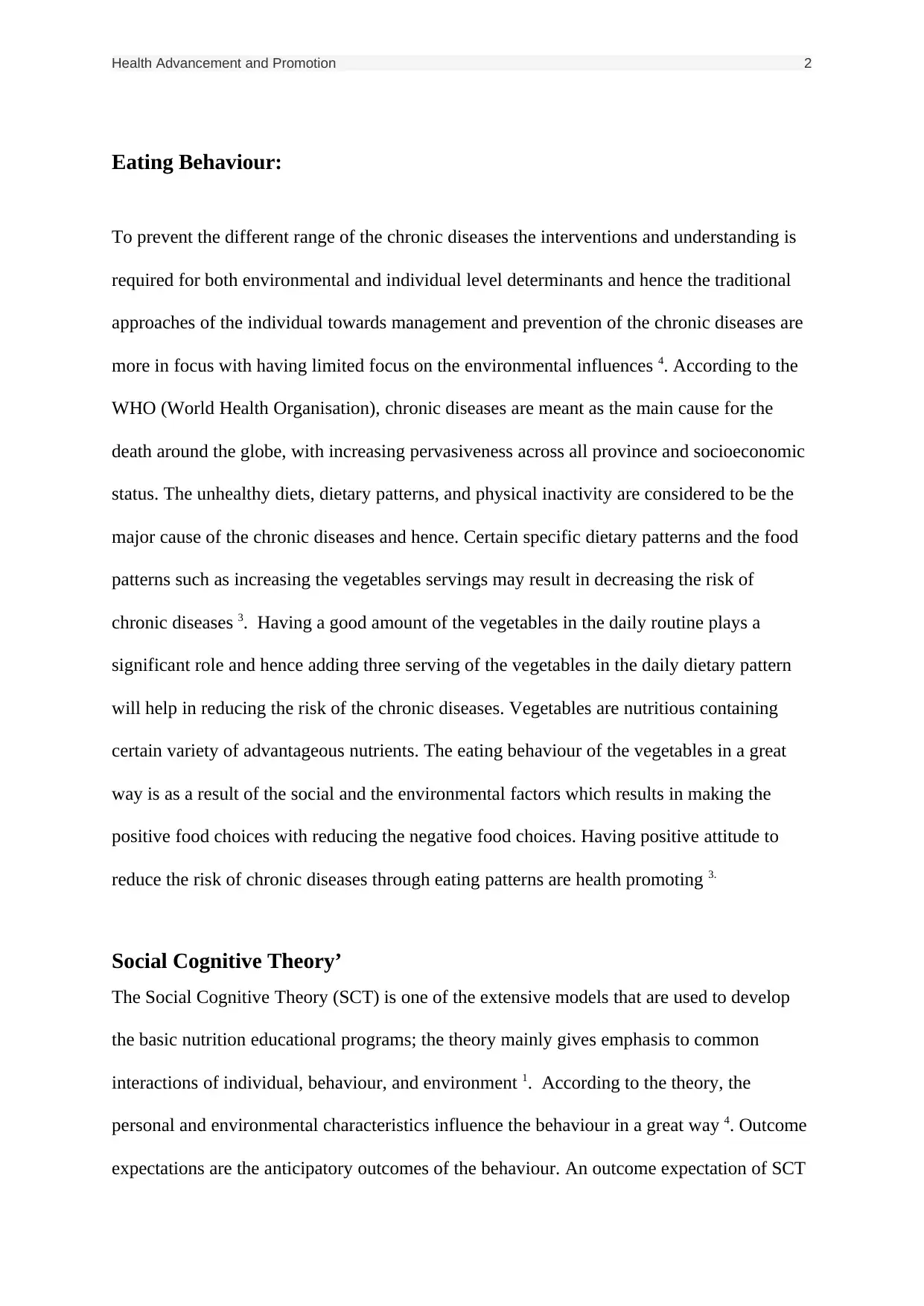
Health Advancement and Promotion 2
Eating Behaviour:
To prevent the different range of the chronic diseases the interventions and understanding is
required for both environmental and individual level determinants and hence the traditional
approaches of the individual towards management and prevention of the chronic diseases are
more in focus with having limited focus on the environmental influences 4. According to the
WHO (World Health Organisation), chronic diseases are meant as the main cause for the
death around the globe, with increasing pervasiveness across all province and socioeconomic
status. The unhealthy diets, dietary patterns, and physical inactivity are considered to be the
major cause of the chronic diseases and hence. Certain specific dietary patterns and the food
patterns such as increasing the vegetables servings may result in decreasing the risk of
chronic diseases 3. Having a good amount of the vegetables in the daily routine plays a
significant role and hence adding three serving of the vegetables in the daily dietary pattern
will help in reducing the risk of the chronic diseases. Vegetables are nutritious containing
certain variety of advantageous nutrients. The eating behaviour of the vegetables in a great
way is as a result of the social and the environmental factors which results in making the
positive food choices with reducing the negative food choices. Having positive attitude to
reduce the risk of chronic diseases through eating patterns are health promoting 3.
Social Cognitive Theory’
The Social Cognitive Theory (SCT) is one of the extensive models that are used to develop
the basic nutrition educational programs; the theory mainly gives emphasis to common
interactions of individual, behaviour, and environment 1. According to the theory, the
personal and environmental characteristics influence the behaviour in a great way 4. Outcome
expectations are the anticipatory outcomes of the behaviour. An outcome expectation of SCT
Eating Behaviour:
To prevent the different range of the chronic diseases the interventions and understanding is
required for both environmental and individual level determinants and hence the traditional
approaches of the individual towards management and prevention of the chronic diseases are
more in focus with having limited focus on the environmental influences 4. According to the
WHO (World Health Organisation), chronic diseases are meant as the main cause for the
death around the globe, with increasing pervasiveness across all province and socioeconomic
status. The unhealthy diets, dietary patterns, and physical inactivity are considered to be the
major cause of the chronic diseases and hence. Certain specific dietary patterns and the food
patterns such as increasing the vegetables servings may result in decreasing the risk of
chronic diseases 3. Having a good amount of the vegetables in the daily routine plays a
significant role and hence adding three serving of the vegetables in the daily dietary pattern
will help in reducing the risk of the chronic diseases. Vegetables are nutritious containing
certain variety of advantageous nutrients. The eating behaviour of the vegetables in a great
way is as a result of the social and the environmental factors which results in making the
positive food choices with reducing the negative food choices. Having positive attitude to
reduce the risk of chronic diseases through eating patterns are health promoting 3.
Social Cognitive Theory’
The Social Cognitive Theory (SCT) is one of the extensive models that are used to develop
the basic nutrition educational programs; the theory mainly gives emphasis to common
interactions of individual, behaviour, and environment 1. According to the theory, the
personal and environmental characteristics influence the behaviour in a great way 4. Outcome
expectations are the anticipatory outcomes of the behaviour. An outcome expectation of SCT
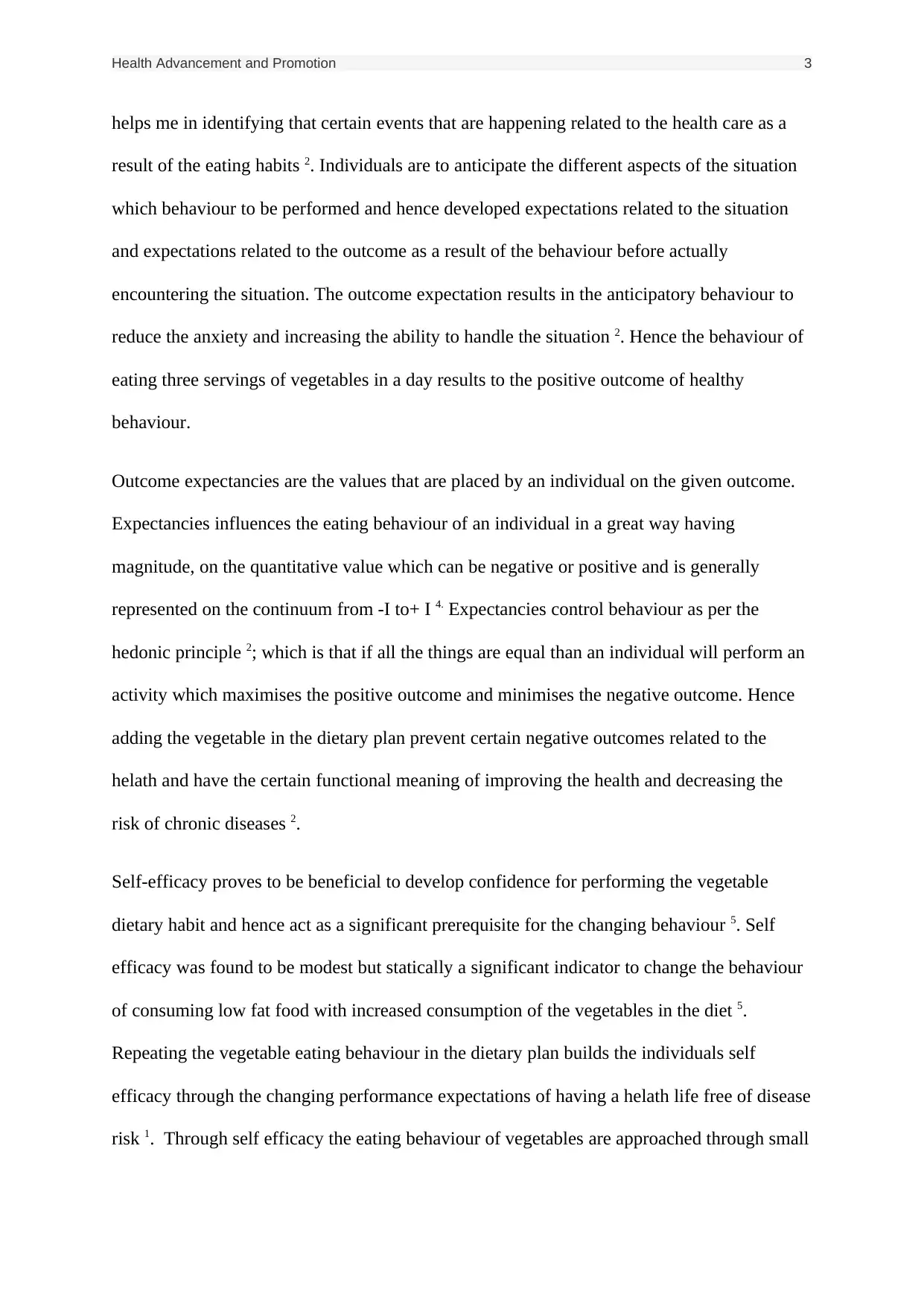
Health Advancement and Promotion 3
helps me in identifying that certain events that are happening related to the health care as a
result of the eating habits 2. Individuals are to anticipate the different aspects of the situation
which behaviour to be performed and hence developed expectations related to the situation
and expectations related to the outcome as a result of the behaviour before actually
encountering the situation. The outcome expectation results in the anticipatory behaviour to
reduce the anxiety and increasing the ability to handle the situation 2. Hence the behaviour of
eating three servings of vegetables in a day results to the positive outcome of healthy
behaviour.
Outcome expectancies are the values that are placed by an individual on the given outcome.
Expectancies influences the eating behaviour of an individual in a great way having
magnitude, on the quantitative value which can be negative or positive and is generally
represented on the continuum from -I to+ I 4. Expectancies control behaviour as per the
hedonic principle 2; which is that if all the things are equal than an individual will perform an
activity which maximises the positive outcome and minimises the negative outcome. Hence
adding the vegetable in the dietary plan prevent certain negative outcomes related to the
helath and have the certain functional meaning of improving the health and decreasing the
risk of chronic diseases 2.
Self-efficacy proves to be beneficial to develop confidence for performing the vegetable
dietary habit and hence act as a significant prerequisite for the changing behaviour 5. Self
efficacy was found to be modest but statically a significant indicator to change the behaviour
of consuming low fat food with increased consumption of the vegetables in the diet 5.
Repeating the vegetable eating behaviour in the dietary plan builds the individuals self
efficacy through the changing performance expectations of having a helath life free of disease
risk 1. Through self efficacy the eating behaviour of vegetables are approached through small
helps me in identifying that certain events that are happening related to the health care as a
result of the eating habits 2. Individuals are to anticipate the different aspects of the situation
which behaviour to be performed and hence developed expectations related to the situation
and expectations related to the outcome as a result of the behaviour before actually
encountering the situation. The outcome expectation results in the anticipatory behaviour to
reduce the anxiety and increasing the ability to handle the situation 2. Hence the behaviour of
eating three servings of vegetables in a day results to the positive outcome of healthy
behaviour.
Outcome expectancies are the values that are placed by an individual on the given outcome.
Expectancies influences the eating behaviour of an individual in a great way having
magnitude, on the quantitative value which can be negative or positive and is generally
represented on the continuum from -I to+ I 4. Expectancies control behaviour as per the
hedonic principle 2; which is that if all the things are equal than an individual will perform an
activity which maximises the positive outcome and minimises the negative outcome. Hence
adding the vegetable in the dietary plan prevent certain negative outcomes related to the
helath and have the certain functional meaning of improving the health and decreasing the
risk of chronic diseases 2.
Self-efficacy proves to be beneficial to develop confidence for performing the vegetable
dietary habit and hence act as a significant prerequisite for the changing behaviour 5. Self
efficacy was found to be modest but statically a significant indicator to change the behaviour
of consuming low fat food with increased consumption of the vegetables in the diet 5.
Repeating the vegetable eating behaviour in the dietary plan builds the individuals self
efficacy through the changing performance expectations of having a helath life free of disease
risk 1. Through self efficacy the eating behaviour of vegetables are approached through small
⊘ This is a preview!⊘
Do you want full access?
Subscribe today to unlock all pages.

Trusted by 1+ million students worldwide
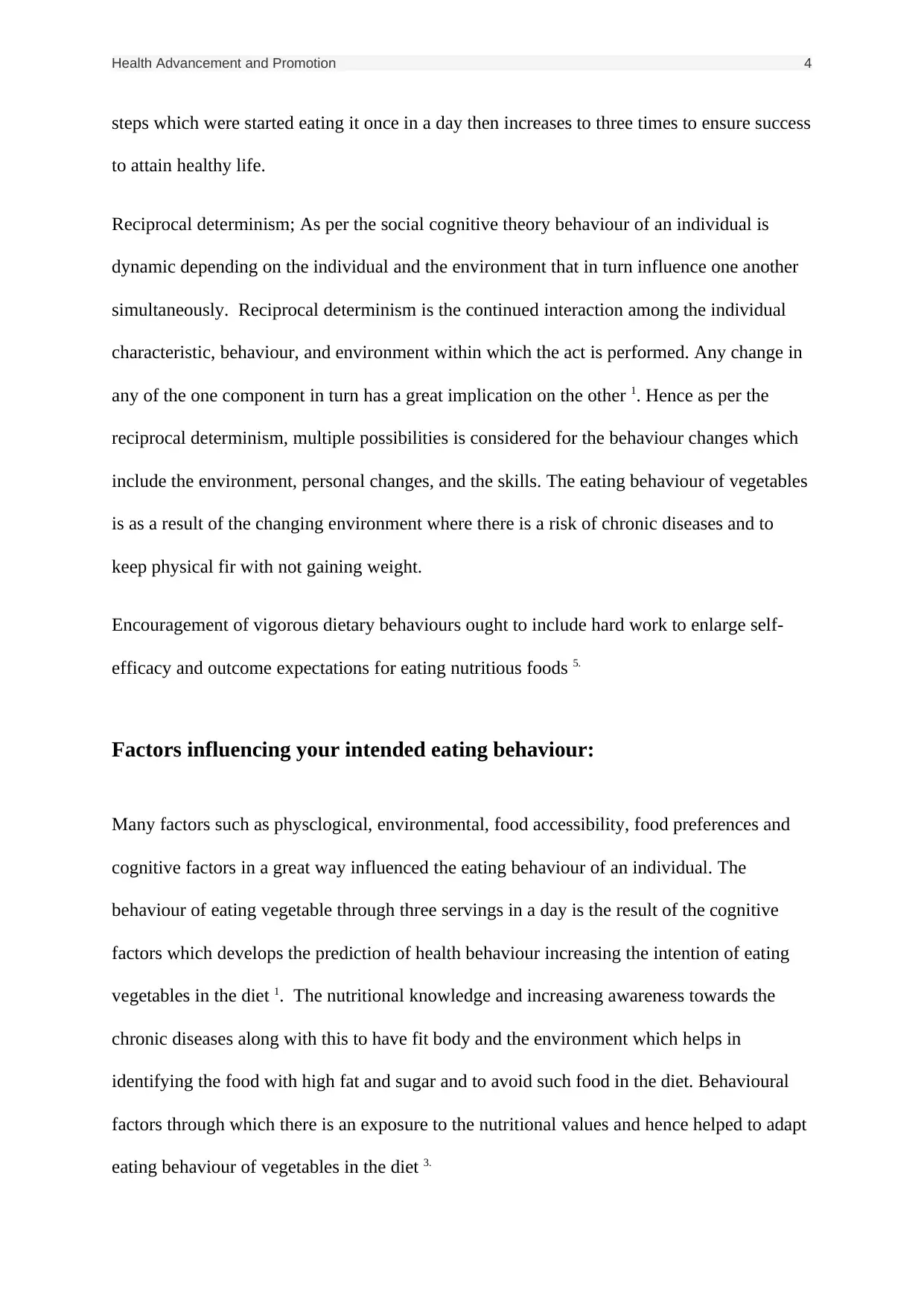
Health Advancement and Promotion 4
steps which were started eating it once in a day then increases to three times to ensure success
to attain healthy life.
Reciprocal determinism; As per the social cognitive theory behaviour of an individual is
dynamic depending on the individual and the environment that in turn influence one another
simultaneously. Reciprocal determinism is the continued interaction among the individual
characteristic, behaviour, and environment within which the act is performed. Any change in
any of the one component in turn has a great implication on the other 1. Hence as per the
reciprocal determinism, multiple possibilities is considered for the behaviour changes which
include the environment, personal changes, and the skills. The eating behaviour of vegetables
is as a result of the changing environment where there is a risk of chronic diseases and to
keep physical fir with not gaining weight.
Encouragement of vigorous dietary behaviours ought to include hard work to enlarge self-
efficacy and outcome expectations for eating nutritious foods 5.
Factors influencing your intended eating behaviour:
Many factors such as physclogical, environmental, food accessibility, food preferences and
cognitive factors in a great way influenced the eating behaviour of an individual. The
behaviour of eating vegetable through three servings in a day is the result of the cognitive
factors which develops the prediction of health behaviour increasing the intention of eating
vegetables in the diet 1. The nutritional knowledge and increasing awareness towards the
chronic diseases along with this to have fit body and the environment which helps in
identifying the food with high fat and sugar and to avoid such food in the diet. Behavioural
factors through which there is an exposure to the nutritional values and hence helped to adapt
eating behaviour of vegetables in the diet 3.
steps which were started eating it once in a day then increases to three times to ensure success
to attain healthy life.
Reciprocal determinism; As per the social cognitive theory behaviour of an individual is
dynamic depending on the individual and the environment that in turn influence one another
simultaneously. Reciprocal determinism is the continued interaction among the individual
characteristic, behaviour, and environment within which the act is performed. Any change in
any of the one component in turn has a great implication on the other 1. Hence as per the
reciprocal determinism, multiple possibilities is considered for the behaviour changes which
include the environment, personal changes, and the skills. The eating behaviour of vegetables
is as a result of the changing environment where there is a risk of chronic diseases and to
keep physical fir with not gaining weight.
Encouragement of vigorous dietary behaviours ought to include hard work to enlarge self-
efficacy and outcome expectations for eating nutritious foods 5.
Factors influencing your intended eating behaviour:
Many factors such as physclogical, environmental, food accessibility, food preferences and
cognitive factors in a great way influenced the eating behaviour of an individual. The
behaviour of eating vegetable through three servings in a day is the result of the cognitive
factors which develops the prediction of health behaviour increasing the intention of eating
vegetables in the diet 1. The nutritional knowledge and increasing awareness towards the
chronic diseases along with this to have fit body and the environment which helps in
identifying the food with high fat and sugar and to avoid such food in the diet. Behavioural
factors through which there is an exposure to the nutritional values and hence helped to adapt
eating behaviour of vegetables in the diet 3.
Paraphrase This Document
Need a fresh take? Get an instant paraphrase of this document with our AI Paraphraser
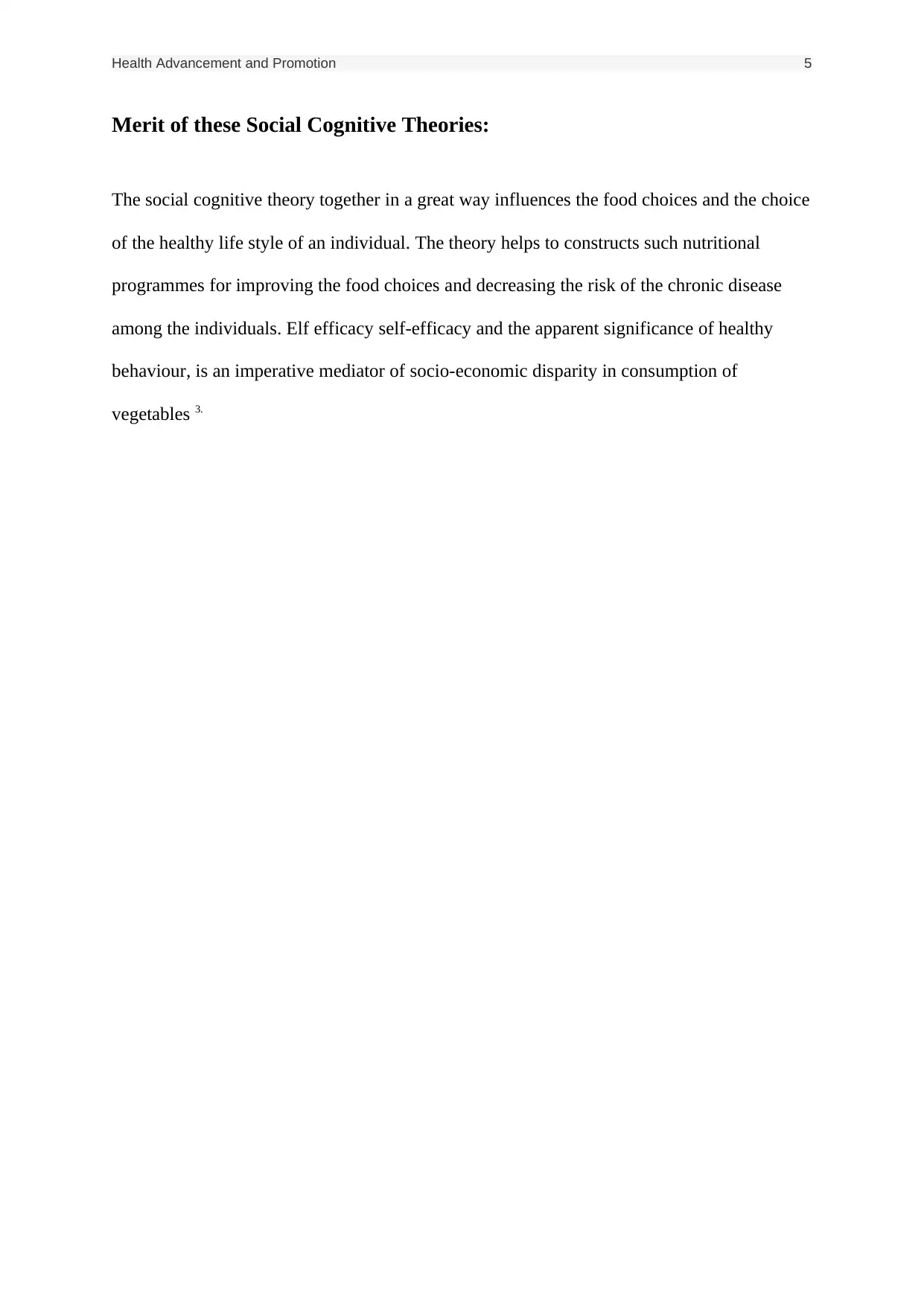
Health Advancement and Promotion 5
Merit of these Social Cognitive Theories:
The social cognitive theory together in a great way influences the food choices and the choice
of the healthy life style of an individual. The theory helps to constructs such nutritional
programmes for improving the food choices and decreasing the risk of the chronic disease
among the individuals. Elf efficacy self-efficacy and the apparent significance of healthy
behaviour, is an imperative mediator of socio-economic disparity in consumption of
vegetables 3.
Merit of these Social Cognitive Theories:
The social cognitive theory together in a great way influences the food choices and the choice
of the healthy life style of an individual. The theory helps to constructs such nutritional
programmes for improving the food choices and decreasing the risk of the chronic disease
among the individuals. Elf efficacy self-efficacy and the apparent significance of healthy
behaviour, is an imperative mediator of socio-economic disparity in consumption of
vegetables 3.
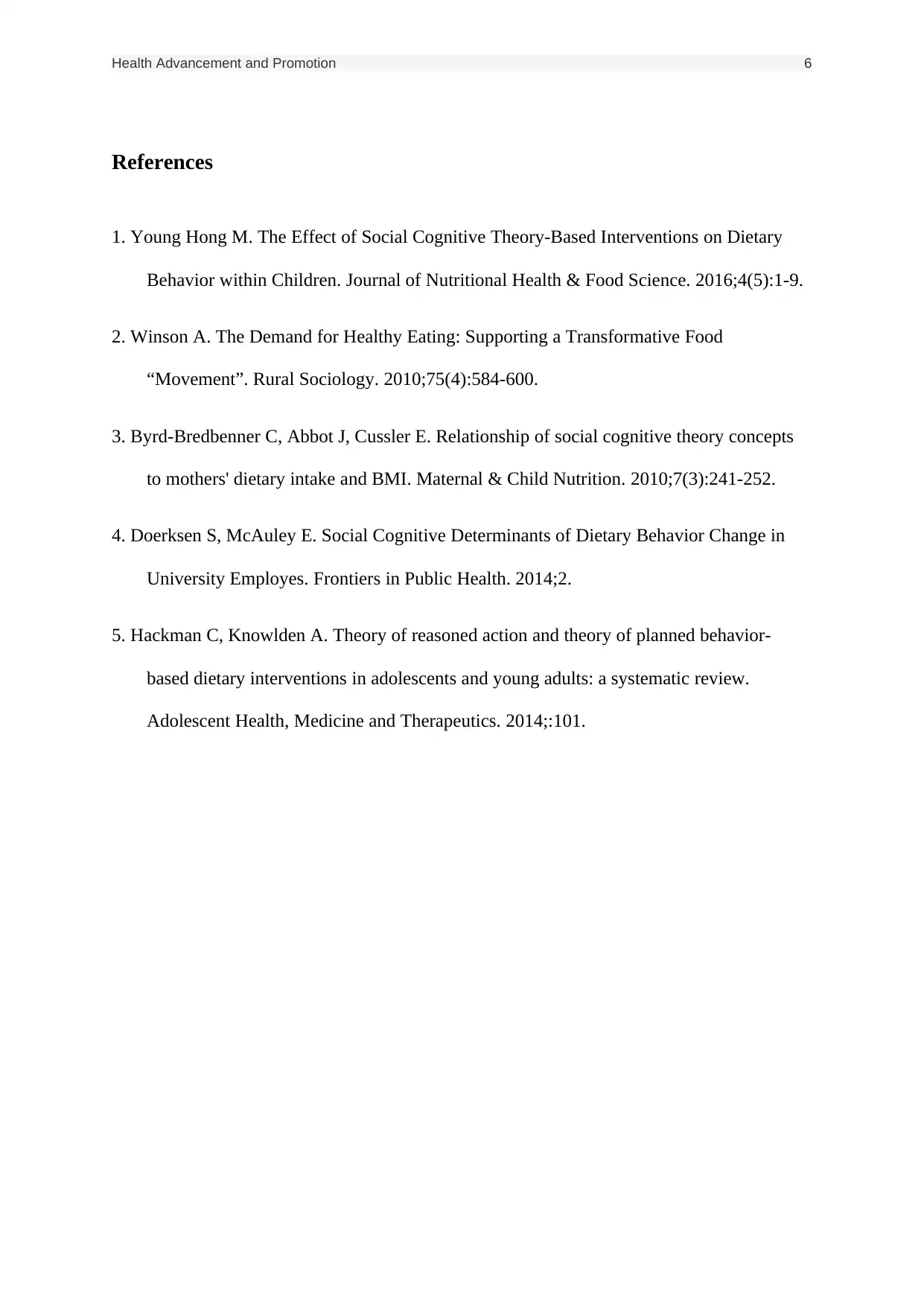
Health Advancement and Promotion 6
References
1. Young Hong M. The Effect of Social Cognitive Theory-Based Interventions on Dietary
Behavior within Children. Journal of Nutritional Health & Food Science. 2016;4(5):1-9.
2. Winson A. The Demand for Healthy Eating: Supporting a Transformative Food
“Movement”. Rural Sociology. 2010;75(4):584-600.
3. Byrd-Bredbenner C, Abbot J, Cussler E. Relationship of social cognitive theory concepts
to mothers' dietary intake and BMI. Maternal & Child Nutrition. 2010;7(3):241-252.
4. Doerksen S, McAuley E. Social Cognitive Determinants of Dietary Behavior Change in
University Employes. Frontiers in Public Health. 2014;2.
5. Hackman C, Knowlden A. Theory of reasoned action and theory of planned behavior-
based dietary interventions in adolescents and young adults: a systematic review.
Adolescent Health, Medicine and Therapeutics. 2014;:101.
References
1. Young Hong M. The Effect of Social Cognitive Theory-Based Interventions on Dietary
Behavior within Children. Journal of Nutritional Health & Food Science. 2016;4(5):1-9.
2. Winson A. The Demand for Healthy Eating: Supporting a Transformative Food
“Movement”. Rural Sociology. 2010;75(4):584-600.
3. Byrd-Bredbenner C, Abbot J, Cussler E. Relationship of social cognitive theory concepts
to mothers' dietary intake and BMI. Maternal & Child Nutrition. 2010;7(3):241-252.
4. Doerksen S, McAuley E. Social Cognitive Determinants of Dietary Behavior Change in
University Employes. Frontiers in Public Health. 2014;2.
5. Hackman C, Knowlden A. Theory of reasoned action and theory of planned behavior-
based dietary interventions in adolescents and young adults: a systematic review.
Adolescent Health, Medicine and Therapeutics. 2014;:101.
⊘ This is a preview!⊘
Do you want full access?
Subscribe today to unlock all pages.

Trusted by 1+ million students worldwide
1 out of 6
Related Documents
Your All-in-One AI-Powered Toolkit for Academic Success.
+13062052269
info@desklib.com
Available 24*7 on WhatsApp / Email
![[object Object]](/_next/static/media/star-bottom.7253800d.svg)
Unlock your academic potential
Copyright © 2020–2026 A2Z Services. All Rights Reserved. Developed and managed by ZUCOL.





